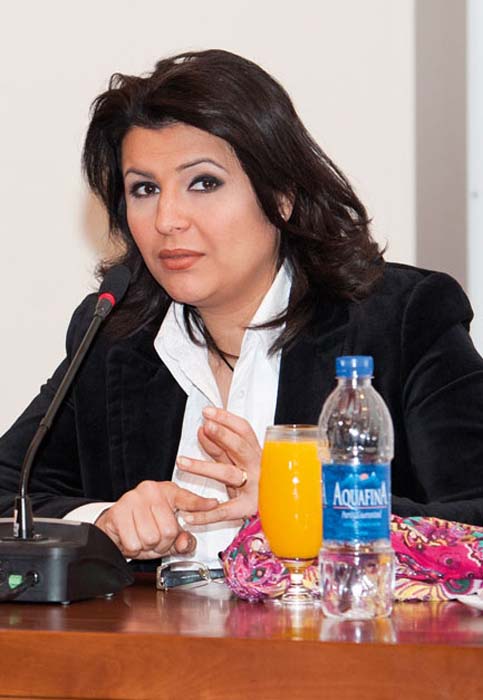|
Living Up to the Standard
Mona El Shazly '96 affirms her journalistic duty during defining
moments in Egyptian history
 Photographed by Ahmad El-Nemr
In today's increasingly competitive
media market, staying on top is a
demanding job, as Mona El Shazly
'96, host of the famous Dream TV talk
show Al Ashera Masa'an (10 pm),
testifies. "The era we're currently
witnessing is unprecedented," said El
Shazly, who came to AUC as part of
Meet the Media lecture series,
organized by the Kamal Adham
Center for Journalism Training and
Research. "As the parliamentary
elections concluded the year 2010, we
thought that the worst was over. There
was enormous pressure on us, as
individuals and institutions, and we
never thought that what is to come
will be even harder."
El Shazly explained that every
episode of her program
leaves her pondering
whether the impact, if any,
will be a positive or negative
one on society. "I always
question if what I've
presented in a given episode
was for the good of the
country," she noted. "The
struggle between political
factions today is more
vicious than ever. It's easy for
us as media personnel to give
up and withdraw, but our
social responsibility dictates
that we do our job and say
no when we're supposed to."
A journalism and mass
communication graduate, El Shazly
worked in the public relations
department of Arab Contractors after
graduation. As she moved on to
pursue a career in media, she worked
as a television hostess for the Arab
Radio and Television Network,
presenting entertainment programs as
well as famous shows including Al
Qadeya Lamm Tohsam Ba'ad (The Case
Remains Open), La Arah, La Asma'a,
La Atakalam (I Do Not See, Hear or
Speak) and La Tathab Hatha Al Masa'a (Don't Go Anywhere Tonight).
When asked if she ever lost hope
during the revolution, El Shazly said
that she almost endured a mental
breakdown on the day of what was
termed as the Camel Battle. "I was
optimistic just one day before," she
recalled. "I felt relieved that Egypt
might not have to endure much loss,
but seeing these mobs assault protestors
completely shattered this belief."
Despite being praised for providing
some of the best coverage of the
revolution, including an exclusive and
moving interview with Wael Ghonim
(MBA '08) after being held in
custody for 12 days, El Shazly
believes that the media has fallen
short. "The media market is limited
in terms of finances and human
resources," she reasoned. "We've got
many talents, but not all have the
proper foundation for the job. As
private media outlets, we've got no
regulations, no umbrella and no
deterrents. Just like the press has
columns, news sections and opinion
editorials, the media operates in the
same way. Many outlets make the
mistake of mixing news with
opinions. What govern us are our
conscience, ethics and education."
El Shazly also reflected on times of
hardship while covering the
uprising. "The pressure was
enormous from regime figures. My
staff and I were subjected to threats
and were terrorized," she said.
"However, today, we're at a period in
time where we shouldn't be
governed by fear, but rather by
reason, enthusiasm and hope."
By Ghaydaa Fahim
|
